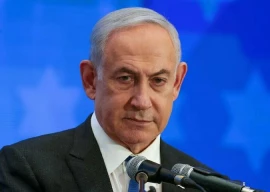
Forty-five civilians were killed in the frontier province, including 23 whose bodies were found with their hands tied behind their backs, as well as five army deserters, the Syrian Observatory for Human Rights monitoring group reported.
The bloodshed and continued flow of refugees prompted Turkey to suggest it might support a "buffer zone" inside Syria, a move likely to enrage Damascus.
In an orchestrated show of support for Assad, huge crowds took to the streets of Syria's cities on Thursday, the first anniversary of unrest which started as largely peaceful protests against four decades of iron rule by the Assad dynasty.
Opposition activists said pro-Assad forces shot at crowds in various locations when they tried to protest against the 46-year-old leader, but residents reported that demonstrators did gather in the smart Shaalan district of Damascus to voice their anger.
The UN-Arab League special envoy Kofi Annan was due to brief the United Nations Security Council on Friday about his talks in Damascus and proposals to end the violence.
"The door of dialogue is still open. We are still engaged with Syrian authorities over Mr. Annan's proposals," Annan's spokesman Ahmad Fawzi said in Geneva. "He's been in telephone contact with the Syrian foreign minister during the course of the day ... as well as with international actors, member states with influence.
Western diplomats expressed pessimism in private over Annan's chances of success.
Syria said on Wednesday it had given a "positive" response to Annan's approach. A Middle Eastern diplomat characterized the reply from Damascus as "not a 'No'". But a senior Western diplomat in the region said Damascus had spurned Annan's ideas.
Aid mission
Official media announced government forces had cleared "armed terrorists" from the city of Idlib, suggesting the army was gaining ground against the uprising, which has killed at least 8,000 people and crippled the economy.
The British-based Syrian Observatory for Human Rights said three soldiers were killed in Homs, further south.
The SOHR gets its information from a network of Syrian residents. Reports from Syria cannot be independently verified as authorities have barred rights groups and journalists and stalled on granting access for international aid groups.
The UN aid chief Valerie Amos said Syria had agreed to a joint mission to assess the humanitarian needs of various cities and towns this weekend, but she indicated this was not enough.
"I repeat my calls to the government of Syria to allow humanitarian organizations unhindered access, so they can help people in need, in a neutral and impartial manner," she said.
Turkey said 1,000 Syrians had crossed its borders in the last 24 hours, fleeing fighting in Idlib, raising the total of registered Syrian refugees in Turkey to 14,000. Among those who escaped was a Syrian general, the seventh to cross into Turkey.
Deputy Turkish Prime Minister Besir Atalay told NTV television that Turkey, which hosts Syrian opposition activists, was working closely with the Arab League to tackle the problem.
"Of course Turkey has a lot of experience on this matter, about what can be done including the buffer zone which you mentioned. The subject you mentioned is among the possible things we will probably work on in the coming period," he said.
Turkey set up a buffer zone along the border with Iraq during the Gulf War in the early 1990s, when tens of thousands of refugees headed towards Turkish territory.
The United Nations says about 230,000 Syrians have been displaced from their homes, including 30,000 who have fled abroad, raising the prospect of a regional refugee crisis.
The government has blamed foreign powers and terrorist gangs for the chaos and say 2,000 soldiers have died in the uprising.
Diplomats say the fighting is developing along sectarian lines, with the Sunni Muslim majority, who make up 75 percent of the population of 23 million, at odds with Assad's Alawite sect, which represents 10 percent but controls the levers of power.
Despite growing international isolation and biting sanctions, Assad can still draw on significant support from within Syria and few expect a swift end to the violence. Deep divisions in opposition ranks have also helped his cause.
Besides Damascus, pro-Assad rallies were staged in numerous cities, including Deraa, which was the epicenter of the original protest movement last year, but has been filled with security forces backed by tanks for the past 24 hours.










1734714228-0/T-Edit-article-images-(2)1734714228-0-270x192.webp)
1734606611-0/Express-Tribune-(8)1734606611-0-270x192.webp)
1734587529-0/Express-Tribune-(1)1734587529-0-270x192.webp)

1731295009-0/Untitled-design-(38)1731295009-0-270x192.webp)








COMMENTS
Comments are moderated and generally will be posted if they are on-topic and not abusive.
For more information, please see our Comments FAQ